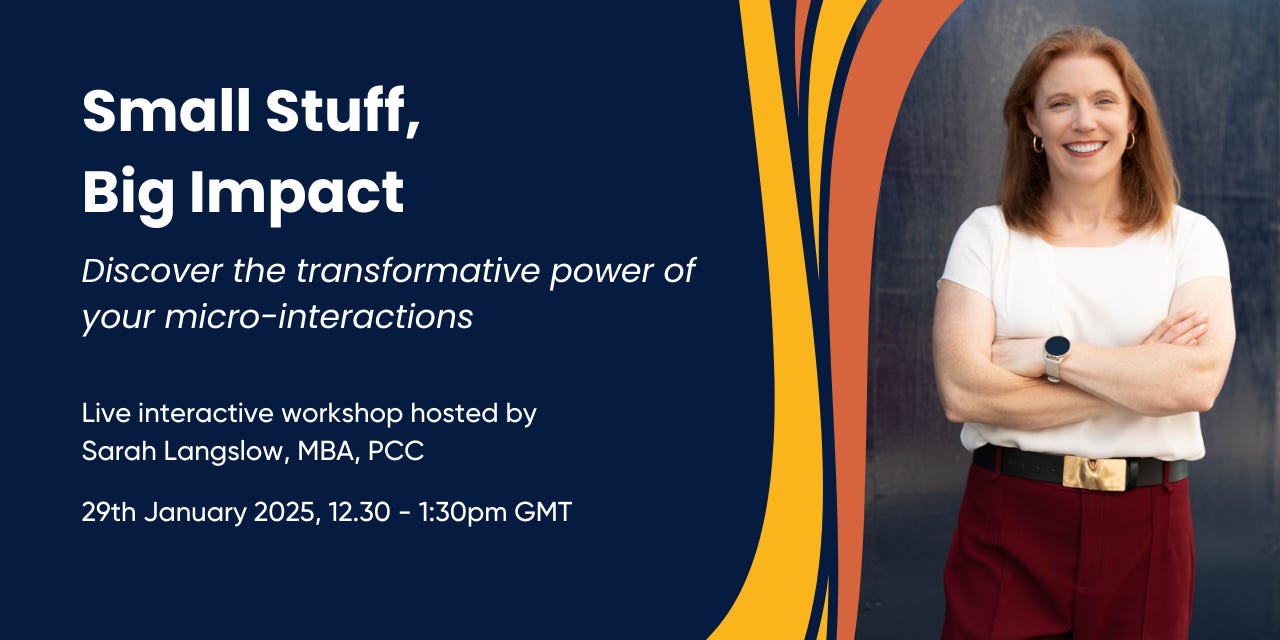Happy New Year (yes, I know, I’m on the late side, but I had a lovely break, thanks for asking 😉). And, Happy Quitter’s Day. That’s right, the second Friday in January is also known as Quitter’s Day because research* suggests it is the average time that people take before they give up on their New Year’s resolutions.
*In fact, the research I can find doesn’t quite show this, though the underlying point is the same – many people’s resolutions don’t last long.
Love them or hate them, New Year’s resolutions, goals, intentions for the year etc. are often something we struggle to follow through on. Many of you will know I’m quite a fan of goals. However, there are a lot of common mistakes we make when setting them which can actually mean we set ourselves up to fail. If you’re already struggling with yours, or perhaps haven’t set any yet, this Substack will help you to rethink goal-setting, and hopefully leave you re-energised about going after them.

Why set goals at all?
If you’re on the fence about goal setting, there is plenty of research to show that goal-setting has a multitude of benefits. These include:
Improved performance – helping us focus our energy and effort on the things which will make us improve;
Improved focus and persistence – helping us stay focused for longer;
More intrinsic motivation – as we are driven by our own interest, curiosity and desire for satisfaction;
Increased autonomy and self-determination – through our perception of being in control and able to make a difference for ourselves;
Increased enjoyment of tasks – we enjoy what we do more, so we sustain engagement and effort;
Increased collaboration – goals promote co-operation within teams and between individuals with shared aims and values;
Improved wellbeing – goal-directed behaviour supports psychological, emotional, and physical wellbeing;
Positive psychological effects – goals encourage us to take on new challenges and help us feel engaged and connected with tasks. Note that avoidance goals, aiming to prevent undesirable consequences, can have the opposite effect;
Greater effort – goals focusing on learning and improvement usually increase our enjoyment of the activity and lead to higher levels of effort;
Enhanced self-esteem – some goals can help us build a more positive self-image, and learn coping mechanisms for challenging times.
If you’re not convinced by that list, then there’s not much more I can say to persuade you! Suffice to say there are lots of good things about goals. However, when we get them wrong, they can be stressful, demotivating, and reduce our self-esteem. Or simply get ignored and abandoned because we feel no emotional connection to them. In those cases at best they’re a waste of time and at worst they’re actively harmful.
So what are the common pitfalls?
Let’s look at five of the most common pitfalls, and how we can avoid them in order to set better goals, and set goals that we’re actually excited to go after.
1. Focusing solely on outcome-based goals
It's tempting to fixate on the end result – be it a promotion, weight loss, or financial milestone. However, in many cases we do not have control over the outcome, as there will be outside factors influencing the result that we cannot control, or even predict. The result? Sometimes we do everything we can towards achieving something and still don’t get there.
An outcome-only approach also overshadows the importance of the journey itself. If the only reward is at the end, through a result we cannot fully control, we lose the opportunity to experience and enjoy learning and progress along the way. It can make goal-seeking a joyless and frustrating experience.
Instead, it’s important to have some process goals as well. That helps you stay focused on the small, daily actions that are required to move you towards that bigger outcome goal, allows you to celebrate and enjoy progress, and means that even if you don’t hit the outcome you hope, you have still much to acknowledge yourself for.
Think about:
What are the small, regular habits and actions I need to embed?
What am I learning along the way?
What wider benefits can I celebrate, outside a single outcome (that may be out of my control)?
2. Pursuing someone else’s goals
I recall a client I worked with talking through the goals she had for our six months coaching together. She seemed flat and unenthusiastic, and as she laid them out they lacked clarity and were full of jargon. “Whose goals are these?” I asked her. After a long pause she finally said “Well, they’re the goals I’m supposed to have. They’re what the organisation would want.”
If you’re setting goals based only on external expectations – whether from family, society, or peers – you’re not likely to achieve them. We have to have some level of emotional connection, of personal investment, in the goals we pursue or the moment things feel hard, or get busy, we will give up. True motivation arises when our objectives align with personal values and desires. The sweet spot, for professional goals at least, is where our personal motivation aligns with the needs and objectives of our team and the organisation.
Think about:
What do you want to achieve? Really?
If no one else was ever going to read your goals, what would you write down?
3. Forgetting systems and structures
A goal without a plan is merely a wish: establishing the systems and support structures you will need to achieve your goal is crucial for success. One of my favourite James Clear quotes is: “You do not rise to the level of your goals. You fall to the level of your systems.” If your systems are not in place and sufficiently resilient to keep you on track (and overcome your resistance) you are making life a lot harder for yourself.
Think about:
What routines or habits do I need to establish to make this goal a reality?
What structures can I put in place to support that? These might be rewards, consequences, reminders, external accountability etc.
How can I set up my environment for success? How do I make it easier to do what I want to do, and harder to avoid what I need to do?
What is the smallest action I could take, right now, that would move me towards my goal?
4. Setting too many goals
Ambition can be a double-edged sword. While it's admirable to strive for multiple achievements, overloading ourselves can dilute focus and energy. Prioritising a select few objectives allows for deeper commitment and higher quality effort, increasing the likelihood of success.
Don’t forget, you can always add more later. One approach is to limit your focus to just three goals or projects at a time. Until one is complete, you don’t get to add another. This helps you focus, relentlessly, on a small number of things rather than jumping between many and ultimately achieving none.
Think about:
What are the three most important things I would like to achieve this quarter/this year?
Consider creating a “parking lot” of other things which you deliberately put out of your mind until one of your first three goals is achieved.
5. Feeling compelled to follow any formula
Goal setting isn't a one-size-fits-all solution. Some people are more motivated by setting intentions or building habits. Perhaps you get excited by Big Hairy Audacious Goals (BHAGs). Perhaps you prefer to break things down short term. Perhaps goals in the traditional sense aren’t for you, and you prefer to set a direction, a compass-bearing if you will, and work with that.
All I would encourage is that you take time to reflect and make a choice intentionally. One of the most frustrating experiences can be to have all the good intentions to set and go after goals, and then see life, and work, and the daily mayhem of our lives (maybe that’s just me) intervene and suddenly six months or a year has flown by and you’ve never quite got around to it.
Think about:
What works for you? What motivates you?
What do you really want? What would help you to achieve that?
So, what are your goals (or intentions, or plans…)? Leave a comment and let me know what you’re going after in 2025, and I might just theme some of this year’s Substacks to help you get there.
Join me in for another Small Stuff, Big Impact workshop
It’s back! I’m running another Small Stuff Big Impact Workshop on 29th January at 12.30pm GMT.
Unlock the hidden power of small, everyday interactions with "Small Stuff, Big Impact: Discover the transformative power of micro-interactions" – this live, online (and complimentary) workshop will introduce you to the world of micro-interactions – those small, seemingly inconsequential moments that have a profound impact on your team’s engagement and performance. If you’re leading or managing others, mastering these moments is essential to building stronger relationships and creating a more motivated, connected team.
In this 60-minute introductory workshop, you will:
🌟 Learn what micro-interactions are and why they matter in leadership.
🌟 Discover how small adjustments in communication, tone, and behaviour can create a ripple effect, transforming your daily interactions into powerful tools for engagement.
🌟 Learn how to translate theory into action – you will leave with practical suggestions to start making subtle but effective changes right away.
Register for your place via this link, and please do share with anyone you know who might like to join.
Places are limited to ensure a truly interactive discussion, so sign up now to avoid missing out.
See you there!
Meme of the week
As you all enjoyed my pre-Christmas post so much, I thought I’d add in a meme of the week as a more regular feature. Enjoy.

Thanks for reading! See you next week for the first “What I’ve been reading…” of 2025 where we will take a look at Four Thousand Weeks: Time Management for Mortals by Oliver Burkeman.




